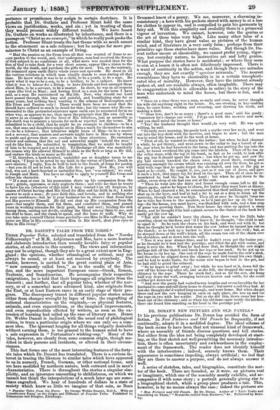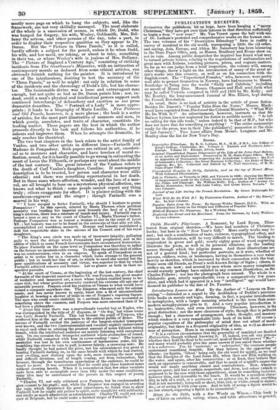DR. DORAN'S NEW PICTURES AND OLD PANELS.*
IN his previous publications Dr. Doran has avoided the form of fiction. In New Pictures and Old Panels he frequently, if not continually, adopts it in a modified degree. The ideal scheme of the book seems to have been that not unusual kind of framework, where an assembly of friends discuss questions and tell stories. But either from the idea not being completely developed at start- ing, or the first sketch not well permitting the necessary introduc- tion, there is often uncertainty and awkwardness in the employ- ment of the framework. The reader does not identify himself with the interlocutors ; indeed, scarcely knows them. Their appearance is sometimes impeding, always artificial ; we feel that they are there to answer a purpose, and do not always answer it well.
A series of sketches, tales, and biographies, constitute the mat- ter of the book. These are founded, as it were, on pictures real or imaginary, which one of the assembly mostly exhibits, and ac- companies it with some story ; a portrait generally giving rise to a biographical sketch, while a group piece produces a tale. This, however, is by no means always the case; indeed the pictures are
New Pictures and Old Panels. By Dr. Doran. Author of "Table Traits and Something on Them," " Monarchs retired from Business," ke. Published by Bent- ley. mostly mere pegs on which to hang the subjects, and, like the framework, are not very skilfully managed. The most elaborate of the whole is a succession of scenes, in which Dr. Dodd, who was hanged for forgery, his wife, Wesley, Goldsmith, Mrs. Bel- lamy the actress, and other persons of the day, take a part, in order to display their respective qualities as they appear to Dr. Doran. But the "Picture in Three Panels," as it is called, hardly affords a subject for the pencil, unless it be when Dodd, his wife, and her maid, are taking, or about to take, something in their tea, or where Wesley's wife is jealous of Mrs. Bellamy. The "Picture of England a Century Ago," consisting of striking incidents from The Gentleman's Magazine, with an intimation of contemporary morals as deduced from some ethical articles, can obviously furnish nothing for the painter. It is introduced by one of the interlocutors, desiring to test the accuracy of the "Three Panels," as well he might: not only in relation to some of the incidents and the chronology of Dodd's life, but his charac- ter. The fashionable divine was a loose and extravagant man enough, but not quite so bad as Dr. Doran paints him ; nor, in- deed, could a man's physical and intellectual powers support such continued interchange of debauchery and exertion as our prose dramatist describes. The Portrait of a Lady" is more appro- priate; it leads to a biography of Marie Lucille. New Pictures and Old Panels, however, is a mere phrase ; the book is a series of articles, for the most part illustrative of manners and men, in which gossip, anecdotes, and traits of character, constitute the leading matter. Those papers are the best in which the author proceeds directly to his task and follows his authorities, if he colours and improves them. When he attempts the dramatic, he only reaches the theatrical. The two best chapters in the book relate to the artist family of Vanloo, and two other artists in different lines—Farinelli and Madame de Pompadour. Both papers are critical in art, aneedoti- cal as to manners and character, and have touches of moral re- flection, sound, for it is hardly possible to go wrong in estimating the court of Louis the Fifteenth, or perhaps any court about the middle of the last century. The great interest of the Vardoos refers to the death of Carl Vanloo's daughter, Caroline. If contemporary description is _to be trusted, her person and character were alike etherial ; and there was something supernatural in her death. But in these oases where affection, wonder, and the love of a mar- vel, are all brought to bear on a mysterious physical affection, one knows not what to think : some people cannot report any thing truly ; others exaggerate for effect. It is plainer sailing with the courtezan-engraver and the singer ; though Farinelli was a marvel in his way. " I have stooped to flatter Farinelli, why should I hesitate to praise Pompadour ? ' In this speech, uttered by Maria Theresa when political necessity was bending her imperial neck beneath the heel of a French king's mistress, there was a mixture of insult and injury. Farinelli was as honest a man as any in the court of Charles VI., Maria Theresa's father. Perhaps Pompadour was as honest a woman as any in the court of Louis XV. ; but honesty was not to be found in the entourage of that able yet idle, accomplished yet worthless, monarch. Honour and honesty maintained a dull but respectable state in the saloons of his Consort and of his royal daughters. "The King's own circle was made up of incarnate iniquity, galloping gaily to meet the deluge which Pompadour had prophesied, and in the eddies of which so many French Governments have encountered destruction. To place Farinelli on the same level as Pompadour was therefore to inflict on the former no inconsiderable wrong. To admire the artistic skill of either was no condescension, even in an empress. To speak of Pompadour as an artist is to notice her in a character which looks strange to the general public ; but in truth her line of art, in which to excel she needed but the poor qualifications of necessity and virtue, was superior to that by which Farinelli achieved renown and fortune. Let us glance at both in their re- spective pursuits. "At the court of Vienna, at the beginning of the last century, the chief favourite of the imperial amateur Charles VI. was Porpora, the great master of recitative and measured art, a man whose tuition enabled many to be- come rich, but whose profuse generosity rendered his extreme old age one of miserable penury. Porpora owed his position at Vienna to what would have ruined a composer anywhere else. The Emperor, who cared only for solemn music, and was never known to smile, burst into a fit of uncontrollable laughter at hearing a shower of trills in one of Porpora's capering fugues. The man who could excite risibility in a sardonic Kaiser, was accounted as something above the common, and Porpora was more esteemed than if he had been a philosopher. "About this time there was a marvellously tuneful boy at Naples, who was distinguished by the title of 11 Rugaczo, or the boy,' but whose name was Carlo Broschi Farinelli. This lad became the pupil of Porpora, who produced him at the age of seventeen to the critical public of Rome. The success of Farinelli excited the jealousy of the longest-winded trumpeter ever known, and the two (instrumentalist and vocalist) nightly endeavoured to excel each other in uttering the greatest amount of notes without taking breath, while the intellectual audience sat mutely listening with enraptured ears. On one occasion the trumpeter scattered whole avalanches of sound, while Farinelli competed with him in never-ending runs.' The instru- mentalist was lost in his own continuance of harmonious noise, till his trembling lips strove in vain to puff, however faintly, a crowning note. He fondly thought he had gained the prize, but his astonishment was great at hearing Farmelli dashing on, in the same breath with which he had started, now swelling, now shaking upon the note, anon running the most rapid and difficult divisions, and at length ceasing, not from exhaustion, but because, through the tumultuous approbation of the audience, he could be heard no more. It was ascertained that he could sing three hundred notes without drawing breath. When it is remembered that few other vocalists have been able to accomplish more than fifty under the same conditions, some idea may be entertained of the powers in this respect of young Farinelli.
"Charles VI. not only criticized poor Porpora, but he condescended to give counsel to his pupil ; and, while the Emperor was engaged in averting the ruin which threatened his great inheritance, he found time to show Farinelli how he might add pathos to spirit, unite simplicity with sublimity, and excite as much admiration as astonishment. Charles VI. could not con- quer at Belgrade, but he could make a finished singer of Farinelli."







































 Previous page
Previous page